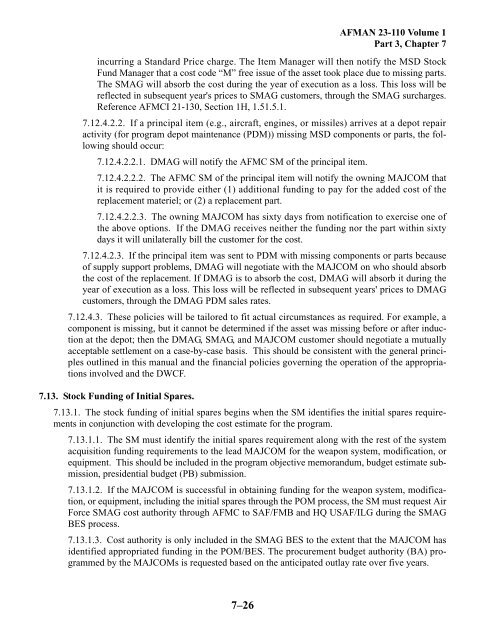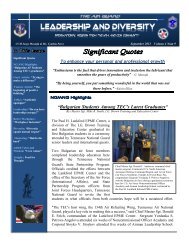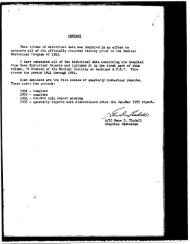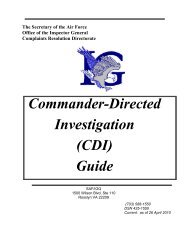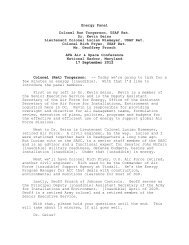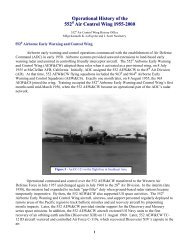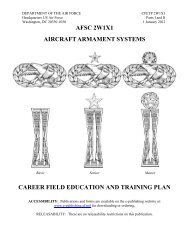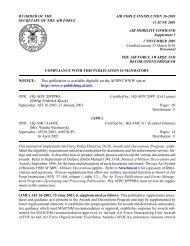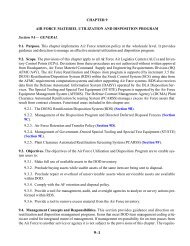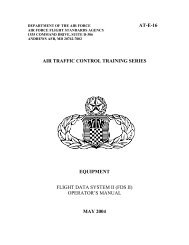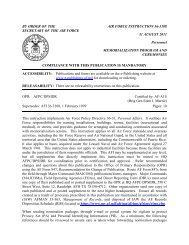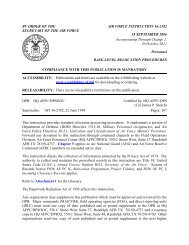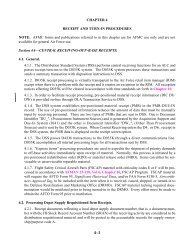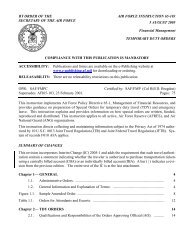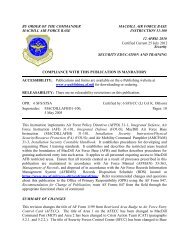Material support division, working capital fund - Air Force Link
Material support division, working capital fund - Air Force Link
Material support division, working capital fund - Air Force Link
Create successful ePaper yourself
Turn your PDF publications into a flip-book with our unique Google optimized e-Paper software.
7–26<br />
AFMAN 23-110 Volume 1<br />
Part 3, Chapter 7<br />
incurring a Standard Price charge. The Item Manager will then notify the MSD Stock<br />
Fund Manager that a cost code “M” free issue of the asset took place due to missing parts.<br />
The SMAG will absorb the cost during the year of execution as a loss. This loss will be<br />
reflected in subsequent year's prices to SMAG customers, through the SMAG surcharges.<br />
Reference AFMCI 21-130, Section 1H, 1.51.5.1.<br />
7.12.4.2.2. If a principal item (e.g., aircraft, engines, or missiles) arrives at a depot repair<br />
activity (for program depot maintenance (PDM)) missing MSD components or parts, the following<br />
should occur:<br />
7.12.4.2.2.1. DMAG will notify the AFMC SM of the principal item.<br />
7.12.4.2.2.2. The AFMC SM of the principal item will notify the owning MAJCOM that<br />
it is required to provide either (1) additional <strong>fund</strong>ing to pay for the added cost of the<br />
replacement materiel; or (2) a replacement part.<br />
7.12.4.2.2.3. The owning MAJCOM has sixty days from notification to exercise one of<br />
the above options. If the DMAG receives neither the <strong>fund</strong>ing nor the part within sixty<br />
days it will unilaterally bill the customer for the cost.<br />
7.12.4.2.3. If the principal item was sent to PDM with missing components or parts because<br />
of supply <strong>support</strong> problems, DMAG will negotiate with the MAJCOM on who should absorb<br />
the cost of the replacement. If DMAG is to absorb the cost, DMAG will absorb it during the<br />
year of execution as a loss. This loss will be reflected in subsequent years' prices to DMAG<br />
customers, through the DMAG PDM sales rates.<br />
7.12.4.3. These policies will be tailored to fit actual circumstances as required. For example, a<br />
component is missing, but it cannot be determined if the asset was missing before or after induction<br />
at the depot; then the DMAG, SMAG, and MAJCOM customer should negotiate a mutually<br />
acceptable settlement on a case-by-case basis. This should be consistent with the general principles<br />
outlined in this manual and the financial policies governing the operation of the appropriations<br />
involved and the DWCF.<br />
7.13. Stock Funding of Initial Spares.<br />
7.13.1. The stock <strong>fund</strong>ing of initial spares begins when the SM identifies the initial spares requirements<br />
in conjunction with developing the cost estimate for the program.<br />
7.13.1.1. The SM must identify the initial spares requirement along with the rest of the system<br />
acquisition <strong>fund</strong>ing requirements to the lead MAJCOM for the weapon system, modification, or<br />
equipment. This should be included in the program objective memorandum, budget estimate submission,<br />
presidential budget (PB) submission.<br />
7.13.1.2. If the MAJCOM is successful in obtaining <strong>fund</strong>ing for the weapon system, modification,<br />
or equipment, including the initial spares through the POM process, the SM must request <strong>Air</strong><br />
<strong>Force</strong> SMAG cost authority through AFMC to SAF/FMB and HQ USAF/ILG during the SMAG<br />
BES process.<br />
7.13.1.3. Cost authority is only included in the SMAG BES to the extent that the MAJCOM has<br />
identified appropriated <strong>fund</strong>ing in the POM/BES. The procurement budget authority (BA) programmed<br />
by the MAJCOMs is requested based on the anticipated outlay rate over five years.


